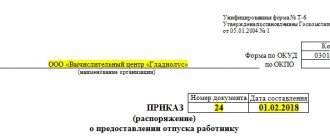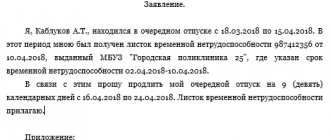Regulatory regulation
This follows from the Labor Code norms, which regulate downtime rules and vacation registration rules. Namely such articles:
- 21st. On the right to receive paid leave.
- 72.2nd. On the definition and formulation of the concept of downtime.
- 157th. About payment for all downtime.
- 139th. About calculations of average wages.
- 123rd. About the procedure for granting leave according to the schedule.
- 121st. About which periods are included in the actual vacation period.
Is there unpaid leave at the initiative of the employer?
Yes, it happens, although according to the law it should not happen. Employers often have reasons, most often of an economic nature, when they are forced to suspend work activities. Then they ask, and sometimes force employees to write an application for leave “at their own expense,” sometimes for a significant duration or for an unknown period. This is extremely disadvantageous for employees because:
- they will not receive payment for the days of forced freedom;
- if such leave lasts longer than 2 weeks, it cannot be taken into account when determining the length of service for paid annual leave;
- if an employee falls ill during a “rest”, sick leave will remain unpaid;
- since during such leave there are no contributions to the pension fund, this period will not be included in the pension period.
FOR YOUR INFORMATION! If an employee has written the required statement, he does not go on “forced” leave, but on ordinary administrative leave permitted by law. The statement confirms his intention and initiative.
Sometimes employees meet the employer halfway of their own free will, weighing the “disadvantages” of taking leave at their own expense with the complete loss of their job.
Forcing you to write an application “at your own expense”
Whatever circumstances the employer may have, if he is unable to ensure the fulfillment of the employment contract on his part - the provision of a workplace, work and wages, then such a contract should be terminated. The employer has no right to force the person to go on administrative leave instead. This issue is covered in detail in the special Explanation of the Ministry of Labor of the Russian Federation dated July 27, 1996 No. 6.
Such a violation provides for administrative liability for each employee who is forcibly “happy” with a vacation:
- for individual entrepreneurs working with personnel – from 1,000 to 5,000 rubles;
- for officials – from 1,000 to 5,000 rubles;
- for enterprises (legal entities) – from 30 thousand to 50 thousand rubles.
NOTE! Employers often use the wording “due to production needs” as a reason for going on forced leave. This is a substitution of concepts: production necessity may force employees to be called to work overtime, on a day off or on a holiday, but in no way reduce their working hours. In any case, such a need must be paid in accordance with the law.
Is such time included in the vacation period?
The Labor Code specifies periods that require inclusion in the vacation record. And they, among other things, include the time during which the worker did not actually perform his duties, but at the same time retained his place of work, if this is provided for by the following:
- Regulatory documents.
- Local acts.
- Collective or labor agreements.
Forced downtime also fits this definition, since during it workers receive wages and are present at their place. Therefore, this time is included in the vacation period.
Voluntary-compulsory
A particularly unprincipled employer, in principle, can offer its staff to go on unpaid leave at their own request. However, everyone should know that in accordance with Art. 128 of the Labor Code of the Russian Federation, this type of rest can be provided to an employee only at his own request for family reasons or other valid reasons. Therefore, the presence of the employee’s own written statement indicating and explaining personal valid reasons in it is the only impetus for such leave.
Unfortunately, the law does not provide for the possibility of sending an employee on unpaid leave, albeit on the basis of a personal statement from the employee himself, but due to circumstances related to the distress or other difficult situation of the employer.
If management encourages a subordinate to write such a statement in every possible way, he has every right to contact the labor inspectorate, the prosecutor's office and even the court.
It is in this vein that this issue was clarified by the Russian Ministry of Labor in clarification No. 6 of June 27, 1996 “On leaves without pay at the initiative of the employer.” In the document you can read that such leaves can be given exclusively at the will of subordinates. There are no forced leaves at the initiative of the employer without pay and are not provided for by law.
Paid vacation during downtime
Payment for such leave is made based on average earnings for the previous 12 months. At the same time, the time of downtime due to the fault of the administration is excluded from its calculation. This is indicated in the regulations on the features and methods of calculating average earnings.
The rules for paying tariff holidays during downtime are as follows:
- If the vacation is during downtime, then only vacation pay is paid. During this period, 2/3 for downtime is not paid.
- If a worker returns from vacation during a period of downtime, then the amount for downtime should be accrued from the first day.
- It’s the same when you go on vacation from downtime. Before the 1st day of vacation, the worker receives 2/3, and from the beginning of the vacation - only vacation pay.
Pay during downtime
Downtime is considered the time during which an employee was at work but did not participate in the production process.
Downtime can occur:
- due to the fault of the employee (for example, if the employee’s actions caused equipment breakdown);
- due to the fault of the employing organization, for example, due to late delivery of materials. Rostrud also believes that the employer is to blame for the situation that led to the revocation of the license and, consequently, the suspension of the enterprise’s activities;
- for other reasons beyond the control of the employer and employee (for example, due to emergency circumstances).
Downtime caused by the employee is not paid.
Downtime due to the fault of the employing organization is paid in the amount of at least 2/3 of the employee’s average salary.
Downtime due to reasons beyond the control of the employer and employee is paid in an amount not lower than 2/3 of the hourly (daily) rate or the employee’s monthly salary.
note
Please note: downtime is paid only if the employee notifies the employer in writing about the start of downtime.
During downtime, employees may be granted leave without pay at their request. It is prohibited to grant such leave forcibly.
How to take a vacation during downtime
In case of downtime due to the fault of the employer, the inability of employees to perform their direct duties does not interrupt the mutual obligations of both. That is, the workers must be in their places.
For which they are also paid compensation, and the employer must comply with all internal regulatory documents provided for by the collective agreement, including the vacation schedule. After all, the Labor Code does not provide for the postponement of vacation agreed upon in the schedule due to downtime. Therefore, it must be completed in a timely manner.
Order
An order is a mandatory element of vacation registration. In this case, the usual T-6 form is used, which must contain the following information:
- About company.
- About the number and date of the order.
- About the employee (initials, plus personnel number).
- About his position and place of work.
- About the rest period, including the start date and exit date. Additional days are also indicated here, if any.
- Plus the signatures of the manager and the vacationer.
Other documents
This:
- Vacation schedule, agreed upon and approved (form T-7). This is the basis for vacation during downtime. Its presence is mandatory for every company, and its absence is a violation of the Labor Code with subsequent fines.
- Sometimes a statement is required.
- Calculation of payments T-60.
- Entry in the personal card and in the marks in the report card.
Procedure
- Inform the manager about the desire to go on vacation as scheduled, specifying the start date. This can be done orally or in writing, in accordance with the procedure established by the enterprise.
- The director issues an order, and the employee signs it for familiarization.
- Based on the order, the accounting department calculates vacation pay.
- Before the start of the vacation, the worker receives vacation pay, and from the 1st day of vacation, the payment of compensation for downtime stops.
- The mark on the report card changes accordingly.
Legislation on the issue under consideration
Downtime is a break in work for reasons of a technological, economic or organizational nature (Part 3 of Article 72.2 of the Labor Code of the Russian Federation). It arises due to:
- employer;
- employee;
- for reasons beyond the control of both parties.
IMPORTANT!
The latter case also includes the unfavorable epidemiological situation in the country and the coronavirus quarantine, in which many enterprises are forced to stop their work and go into idle mode.
During the introduction of downtime, the employee is either at the workplace or is relieved of this duty by decision of the employer. However, downtime is not recognized as rest time: the employee can be called to his workplace at any time.
Annual leave is guaranteed by the Labor Code to all working citizens (Article 114 of the Labor Code of the Russian Federation). The introduction of downtime for any reason is not an obstacle to providing the employee with paid rest. Labor legislation does not contain any restrictions in this regard.
Thus, leave during downtime due to the fault of the employer, as well as for any other reason, is provided in the usual manner.
IMPORTANT!
On April days declared as non-working days in the country, if the employee is on vacation, then these days are not included in the number of vacation days and vacation for these days is not extended.
Consequences and responsibility
The administration's requirement for a worker to go on unpaid leave during downtime instead of the scheduled tariff is illegal. And it can be appealed by the employee to the labor inspectorate or the prosecutor's office. In this case, the consequences for the employer are:
- Restoring the right to leave for an employee.
- Imposing a fine on the manager.
- Ban on leadership positions for up to 3 years.
In addition, delaying vacation pay is also punishable. For each day of delay, the employee is paid a certain percentage, and a fine is imposed on the guilty manager.
The video below shows the accrual of vacation in 1C 8.3 Accounting:
Example of vacation pay calculation
Due to the seasonal downturn, Company LLC introduced idle time from June 1 to August 31, 2021. Employees, in accordance with the order, are paid 2/3 of their average earnings during this time. Manager S.S. Semenov, in accordance with the schedule, is granted another vacation from July 1 to July 14. The period from June 2021 to May 2020 was fully worked out by Semenov. For each month he was paid a salary of 30,000 rubles. and a bonus of 10,000 rubles.
The estimated period is from July 2021 to June 2021. But June 2020 is downtime, so this month must be excluded from the calculation. Let's calculate Semenov's vacation pay as follows:
In addition to vacation pay, in July Semenov will receive compensation for downtime from July 15 to July 31:
Is sick leave included in the calculation of compensation for vacation upon dismissal?
All general grounds for termination of employment relations are enshrined in Article 77, Article 78 of the Labor Code of the Russian Federation. However, these are not all the reasons why a contract with the head of an enterprise can be terminated. Article 278 of the Labor Code of the Russian Federation provides additional grounds for this, applicable only to the director of the organization:
- Removal of the head of the debtor company in connection with the assignment of bankrupt status to it;
- The adoption by the authorized body or the owner of the organization of a decision to terminate the employment contract with this person;
- Additional reasons for terminating the relationship between an employer and a managerial employee are set out in this document.
What payments for the billing period should be taken into account when calculating vacation pay?
When calculating vacation pay, it is not necessary to take into account social payments, as well as everything that is not related to wages. Namely, financial assistance, payment for food, travel, training, utilities, recreation, etc. This is stated in paragraph 3 of the Regulations approved by Decree of the Government of the Russian Federation of December 24, 2007 No. 922.
When an employee is transferred within an organization, the employment contract with him is not terminated - just some conditions in it are changed. Therefore, when calculating vacation pay, take into account the payments that were accrued to the employee for the time when he worked part-time. Naturally, only those that are included in the billing period. This follows from Article 72 of the Labor Code of the Russian Federation, paragraph 2 of the Regulations, approved by Decree of the Government of the Russian Federation of December 24, 2007 No. 922.









